Bravery in (Collapsing) Context
Endorsing Can Be Brave-- Sometimes Refusing to Endorse is Even Braver.
Hello, Dames Nationals!
Dame Margaret here, back once again to opine on pop stars and political endorsements. While the temptation to write a tribute to the newly late, always great Maggie Smith was enormous, no lone Dame could do justice to that Grande Dame’s legacy. For now, let me just leave you with this delicious photo of her in costume as Miss Bowers from Death on the Nile (1978):
And this list of 10 notable Maggie Smith performances you can stream this week. This list contains both favorites I am eager to re-watch, like Death on the Nile’s 1982 companion film, Evil Under the Sun:
And films that are entirely new to me, like 1972’s Travels with My Aunt, a George Cukor-directed film that Maggie Smith took on after Katherine Hepburn dropped out. Please let me know in the comments which, if any, you stream.
Now, from late queens to timely ones…
Chappell Roan and Her Collapsing Context
Two weeks ago, I dedicated an issue to measured praise of Taylor Swift’s decision to endorse Kamala Harris. This week, I’m back on the Pop Politics Beat, but this time I want to talk about why it’s equally valid, and arguably braver, for Chappell Roan to refuse to endorse any presidential candidate— as she did in a profile published earlier this week in The Guardian. I am going to provide her quote now, independent of further context, because that’s likely how you encountered it— presuming you heard of this contretemps at all:
“I have so many issues with our government in every way,” [Chappell Roan] says. “There are so many things that I would want to change. So I don’t feel pressured to endorse someone. There’s problems on both sides. I encourage people to use your critical thinking skills, use your vote – vote small, vote for what’s going on in your city.” (source)
If you look at that quote in a vacuum, it’s not great. In fact, if Taylor Swift had said the exact same thing, I would have perceived it as a tacit endorsement of Donald Trump. So why, when it’s coming from Chappell Roan, would I consider it political bravery, or even effective strategy? Huge twist: it’s the CONTEXT!
Keepin’ It Classy-fied
Fancy some music that you can lindy hop to? Pledge to Travels With Brindle’s Kickstarter (launched just this week!) for a pre-order of her Sparks tribute album!
Have you ever wanted to be a freelance writer? Jen A. Miller has been a Hired Pen for almost 20 years and shares her six-figure earning power knowledge (the highs, the lows, the gripes and all), in her FREE Notes from a Hired Pen newsletter, and in her charming — and charmingly cheap — $10 eBooks.
Thank you to our advertisers!
You help keep us going and we appreciate it so very much! Do you sell items or provide services that readers of this newsletter might like to buy?
You can reserve your spot for future issues right now! An ad for a single issue is $25, or you can buy a month’s worth of ads (in 4 consecutive newsletter issues) for just $50.
(Ad maximum is 300 characters, including emojis. All ads are text-only and subject to TBD approval. Limit four total ads per issue. Full details in our handy fact sheet!)
I want to pause now and define a term I’ve already used a couple times: context collapse. Per the Wikipedia article I just linked, it’s a phenomenon that “occurs when a surfeit of different audiences occupy the same space, and a piece of information intended for one audience finds its way to another,” usually with negative consequences. Put less academically, it’s when something constructed to exist within one particular context— a known person’s work, a specific conversation, etc.— is encountered by people ignorant of that context, and it’s part of what’s happening to Chappell Roan right now.
Roan’s rise to fame has been disconcertingly rapid, especially for Roan herself. As hard as it is to believe, this quote and the controversy it’s engendered could be the first thing many people have heard about her politics, or even her existence.
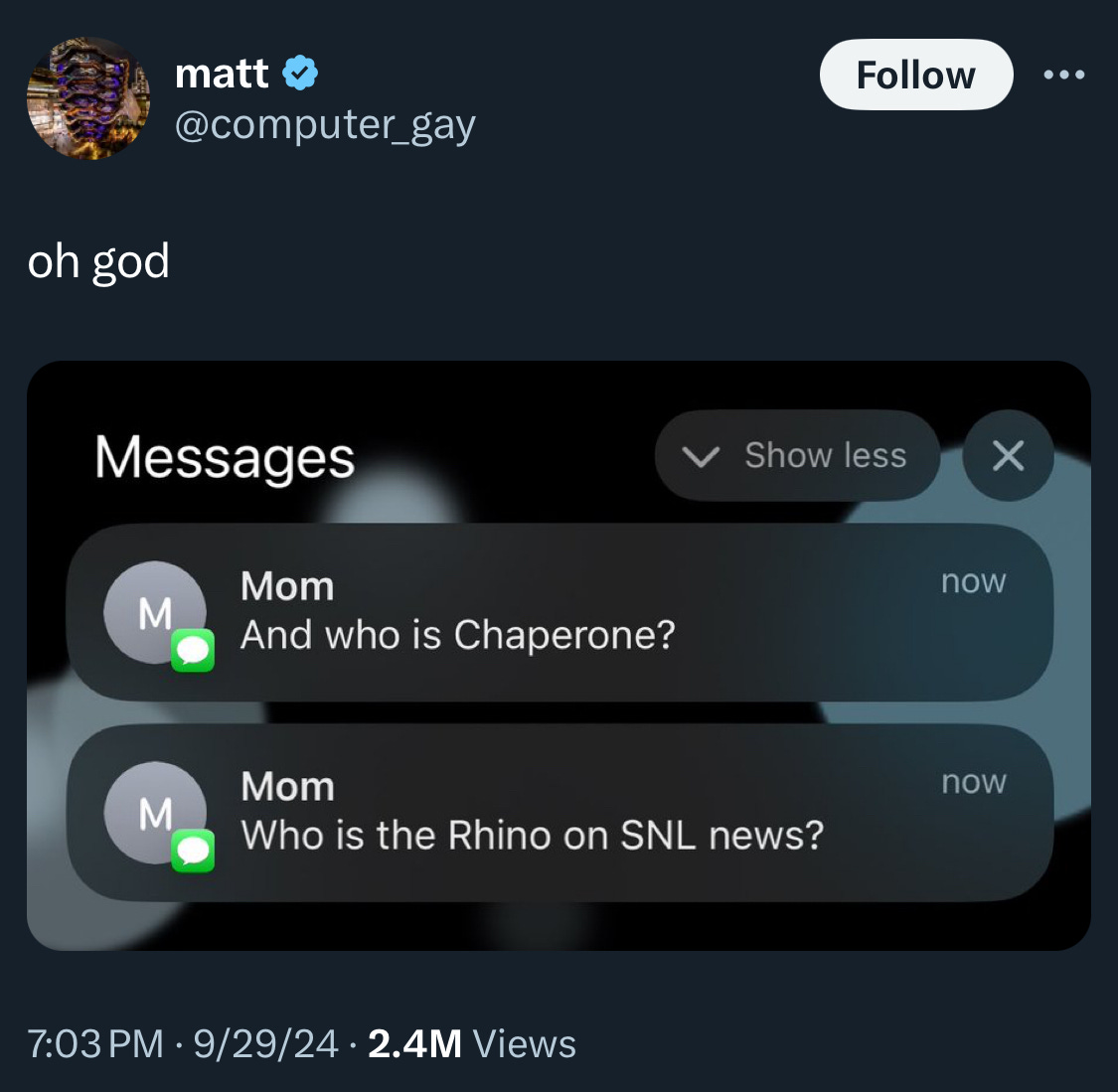
So that’s one aspect of this whole mess: Chappell Roan is used to being an artist whose fan base was small, sincere, and invested in understanding her. She is used to speaking to people who paid attention because they want to hear her. Unfortunately, she is now famous enough that new people are finding her every day, and— worse— famous enough that it’s become more profitable to police her expression than it is to comprehend it. To put it in terms of Search Engine Optimized Headlines, Chappell Roan has graduated from “our relatable queen” to “your problematic fave.”
While some people may be reacting to this quote from honest ignorance, the majority of people contributing to this conflagration are not lacking context. Many of them are either dedicated Chappell Roan fans or people who habitually consume and produce commentary about pop-culture, both groups well aware of how she’s presented herself to date. Nevertheless, for a combination of cynical and sincere reasons, they’ve seized upon one unguarded quote and are sharing it as though it tells them more about Chappell Roan’s politics than the years of dedicated, thoughtful action that precede it. When subject to this kind of fevered scrutiny, seeming wishy-washy for one second becomes more meaningful than being politically resolute for your entire known career. That’s the thing about The Discourse: it’s never met a context it couldn’t collapse.
With context restored, however, Roan’s quote appears far different. Starting small, I want to place this quote in the context of the profile from which it was extracted. The phrase that’s attracted the most critique is Roan’s statement that “there’s problems on both sides.” With its sinister Trumpian resonance, it leaves Roan open to accusations of “equivocation”— but only if you isolate it from the rest of her quote. The very next sentence in the profile ought to contradict such criticism:
The change she wants to see in the US in this election year, she says instantly, is “trans rights. They cannot have cis people making decisions for trans people, period.”
This direct statement about Roan’s political goals demonstrates that she is not making some mealy-mouthed claim that “both sides” are equivalent to avoid alienating either. Instead, Roan states that she’s working towards a radical political future where minority rights are not subject to majority rule and correctly observes that neither party is pursuing that future.
Moreover, as further details in the profile bring forward, this statement is in line Roan’s prior advocacy for causes which neither party is effectively advancing, like ending Israel’s brutal occupation of Palestine. Last but not least, the profile also shares that Roan is suffering from severe depression characterized by “brain fog, forgetfulness, poor focus and ‘a very lacklustre viewpoint.’” So even if you felt her comments needed defending, right in the piece, you’re given reason to extend this 26-year-old pop star a little grace.
If this were the most direct and substantive political opinion Roan had shared to date, seizing upon this one phrase could be defensible. But that is, once again, not an issue here. Only ten days prior to this profile in The Guardian, Rolling Stone Magazine shared their cover story on Chappell Roan, which contained both her unguarded feelings about the presidential race when Joe Biden was still the democratic nominee:
“I’m pretty, ‘Fuck the government, and fuck everything that’s going on right now,’ ” she says, middle fingers in the air. “I don’t have a side because I hate both sides, and I’m so embarrassed about everything going on right now.” (source)
And her significantly more polished response after Kamala Harris took his place:
“Right now, it’s more important than ever to use your vote, and I will do whatever it takes to protect people’s civil rights, especially the LGBTQ+ community,” she tells me in August. “My ethics and values will always align with that, and that hasn’t changed with a different nominee. I feel lucky to be alive during an incredibly historical time period when a woman of color is a presidential nominee.” (source)
While the first of these two quotes can still be critiqued for being “immature” or appearing apathetic, the latter is very clear: Chappell Roan will do whatever it takes, including voting, to protect people’s civil rights. Regarding the second quote, I have a question for you to consider: if we’re all savvy enough to recognize that “feeling lucky” to be alive during Harris’s candidacy is still not endorsing her, why would the phrase “both sides” suddenly convince us that an outspoken queer artist whose primary issues are trans rights and freedom for oppressed people might secretly be a Trump supporter? If we can see through publicist-finessed doublespeak, shouldn’t we also be astute enough to recognize authentic radicalism even when it’s imperfectly expressed?
Finally, a common thread of critique that arises when queer, openly political artists misspeak goes something like: “if she wants to profit from queer aesthetics, then she needs to accept a higher standard of scrutiny for her political speech.” This argument drives me nuts because it starts from a false premise: that aligning yourself with queerness, particularly in a politically substantive way, is a consequence-free shortcut to financial success in pop music. It’s challenging to disprove on an individual level as you cannot separate a successful artist from their political context— like, would Chappell Roan be as much of a sensation without her radical queerness? It’s hard to say, but more because queerness is so integral to her art than because it’s some kind of prerequisite for commercial success. However, if we compare Roan to other successful pop stars, we can certainly see that a straight, cis, and largely apolitical path to massive success still exists.
While it’s tempting to bring our foremost largely apolitical blondie into the discussion here, Swift’s rise to fame during the 2010s is too far removed from the present moment for comparison to be fair. But, through the coveted opening spot on her Eras Tour, Taylor did anoint another Apolitical Pop Blonde whose rise to fame is an illustrative parallel: Sabrina Carpenter.
While Chappell has deliberately obscured her approachable Midwest Princess looks with drag, Sabrina’s aesthetic is so resolutely femme that one Twitter user memorably described her as has “the kind of gal they painted on the side of B52 bombers.” At the Governor’s Ball, when Chappell revealed that she’d refused an offer to perform at the White House for Pride and critiqued our government’s treatment of people in occupied lands, Sabrina’s celebrated political commentary was saying “people who hate Pride / can suck my Gov Balls.” I do not make this comparison to critique Sabrina, whose campy high femme aesthetic feels authentic to her as an artist and brings me great delight. Not every artist needs to make avowedly political art. But if Sabrina can achieve great fame and success in 2024 while remaining apolitical and aesthetically compliant, then Chappell Roan— certainly Sabrina’s equal in talent, charisma, and beauty— could have done the same. Instead, her identity and art have led her to a radical political path that is a lot more challenging to navigate.
This brings me back, at long last, to my previous piece on Swift’s endorsement of Kamala Harris. Taylor’s demure feminine blondeness has long attracted right-wing projection from both avowed white supremacists and implicit ones— a fact she herself cited as a motivating factor for her public endorsement of Kamala Harris. Without allying herself to a side, nothing in Swift’s actions or self-presentation gives political substance to her highly personal, white grievance-focused feminism. Chappell Roan is the opposite. She has done such a successful job of politicizing her image— and doing so while claiming her roots in a part of America often considered Trump country— that the Harris-Walz campaign openly coopted her aesthetic to ornament their campaign:
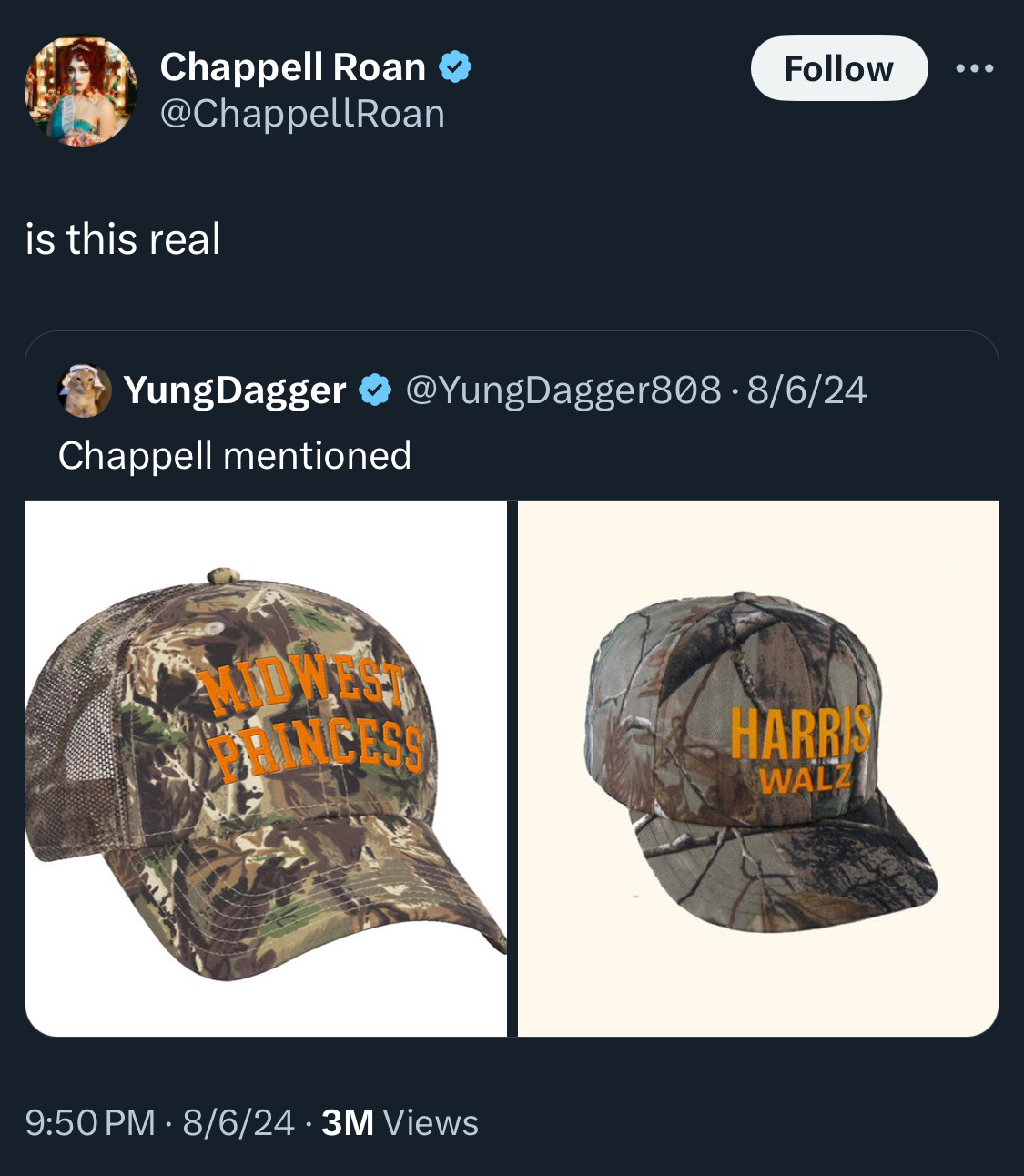
Where Taylor needed to make an endorsement in order to accrue political integrity, Chappell was right to refuse to make one rather than letting her hard-won political integrity adorn a political party whose actions fall short of her expressed ideals. Just as she refused to go “be a monkey for Pride” at the Biden White House, she does not want to loan her image to a Democratic Party who might paint it onto the side of a bomb they’re sending to Israel. Chappell Roan’s words may have been imperfect, but the clarity of her actions should have earned her more trust from fellow progressives. Her endorsement would not have so much value if she had not worked so hard to infuse her pop identity with political substance. Moving forward, when the Discourse tries to collapse her context, we should fight back instead of letting her get buried.
Thank you for coming to my TED talk— and waiting five extra days to receive it. I hope it was worthy of your patience and your time.
XO/ Dame Margaret
This week’s issue brought to you by:


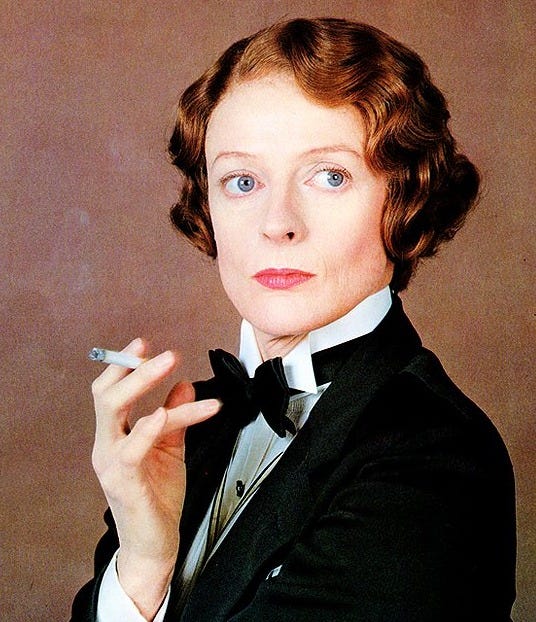
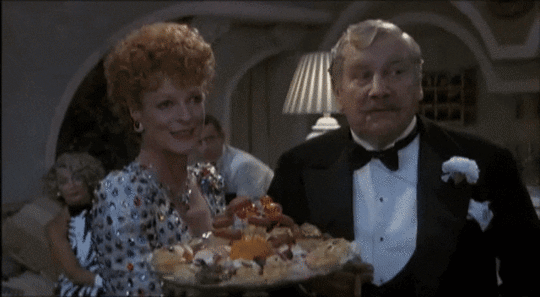

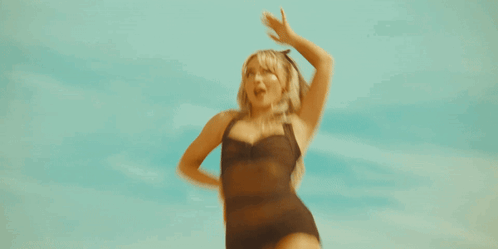
Well said as always, Margaret
I just want to know where Chappell’s PR person/ the record label’s PR is. There just so much stating and restating and correcting going on. There’s the ‘stop stalking me videos’, two major profiles, canceling concerts to perform on the MTV Awards and now cancelling another festival. I am not her target, so I’m just observing the discourse. But doesn’t EVERYONE know that literally the phrase “ on both sides” is distinctly Trumpian? And that no matter how many other quotes she makes, repeatedly saying “both sides” is going to get her bad PR?
You can criticize Taylor for being too measured and calculating for the best effect (the Easter eggs are exhausting in their own way) but i think Chappell would benefit from professional career guidance and am surprised the label hasn’t stepped in yet.